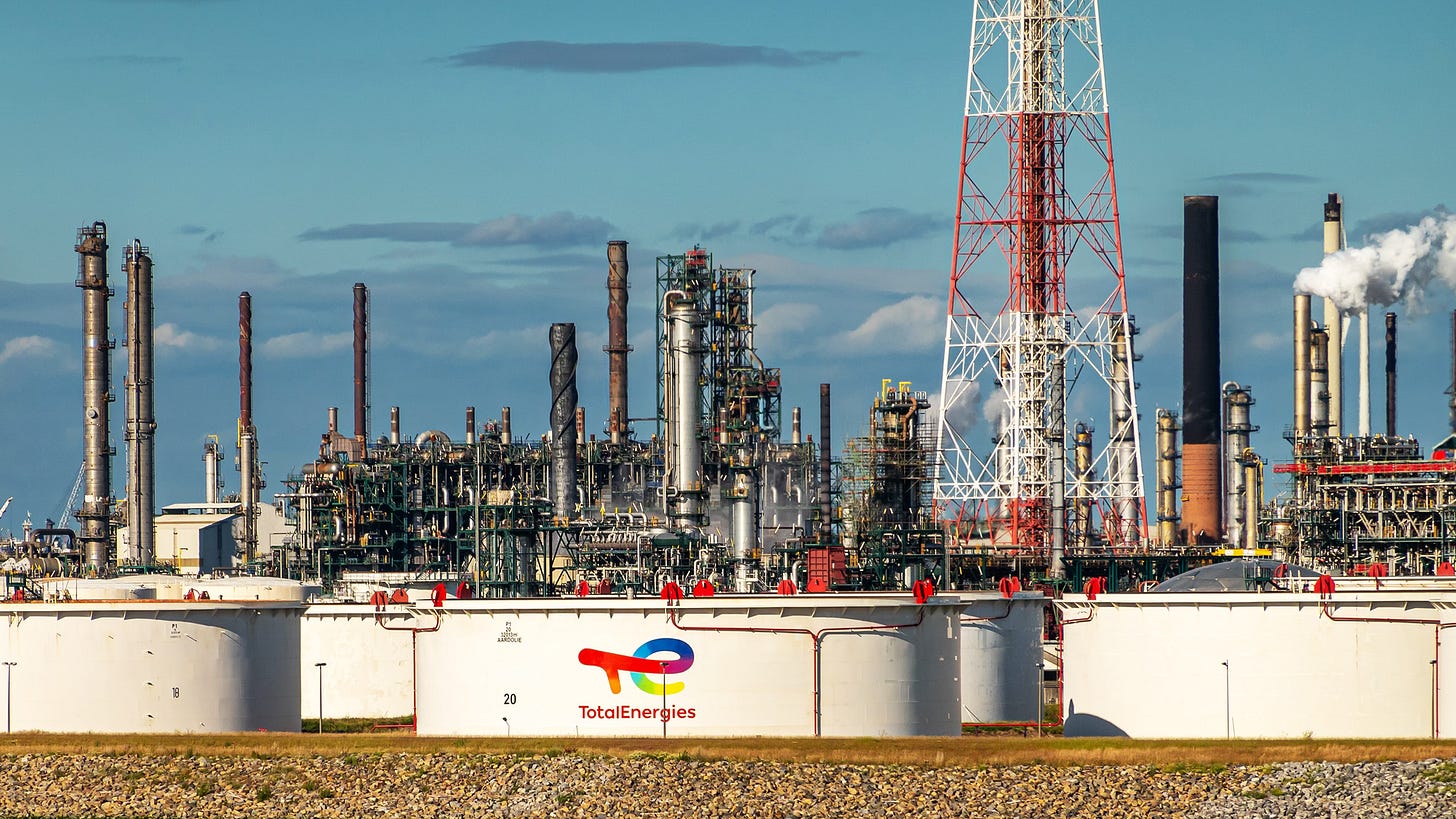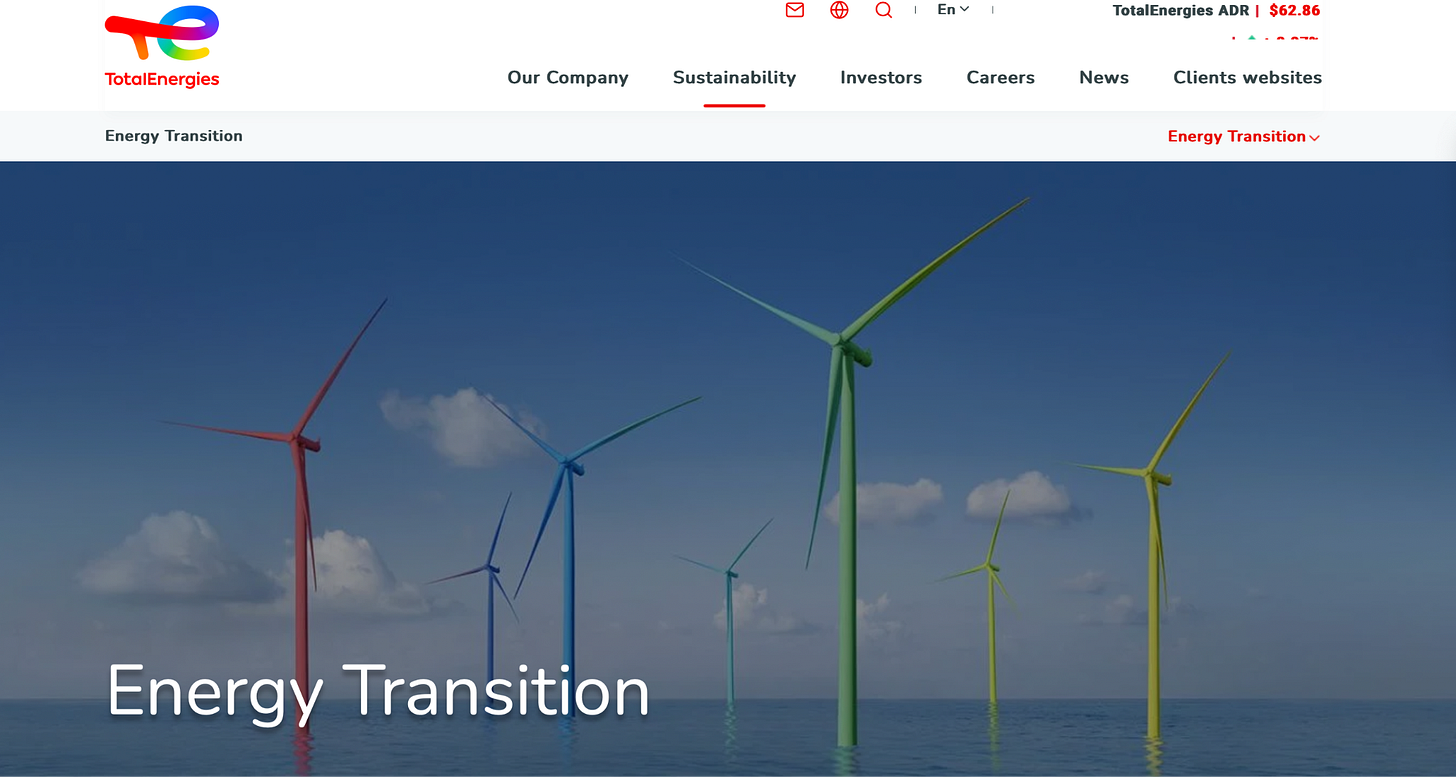Oil giant Total’s net zero claims broke the law, court rules
The ruling is the first court judgment against an oil company for statements about its role in combatting the climate crisis.

A Paris Court ruled Thursday that French oil giant TotalEnergies is misleading consumers with claims that it aims to reach “net zero” emissions and help lead the energy transition even while it makes plans to increase its fossil fuel production, marking the first time an oil company has been forced to remove such claims by a court of law.
By promoting its “ambition to achieve carbon neutrality by 2050” and “to be a major player in the energy transition” as it pursued new oil and gas projects across the world, Total misrepresented its environmental commitments in violation of European Union consumer protection law, the court ruled.
Total “deliberately made an environmental claim likely to mislead consumers, by leading them to believe that by buying its products or services, they were participating in the emergence of a low-carbon economy,” according to a translation of the court’s decision.
The French court ordered Total to cease those statements within a month or face a fine of 10,000 euros per day, and to display the court’s ruling on its website for 180 days.
The case, filed in 2022 by NGOs Greenpeace France, Friends of the Earth France, and Notre Affaire à Tous, is part of a growing global wave of climate lawsuits against fossil fuel companies. One of the biggest and fastest-growing categories of those lawsuits are cases relating to false climate or environmental advertising, according to a report by Oil Change International and Zero Carbon Analytics last year.
The groups filed the lawsuit after Total rebranded itself in 2021 as TotalEnergies and launched a campaign touting its new “carbon-neutral approach, together with society,” along with goals to reduce its greenhouse gas emissions. But as of 2023, the company was the world’s second-largest developer of “carbon bombs,” or massive fossil fuel extraction sites, reported Le Monde. Total is still expanding its oil and gas operations and ownership of fossil fuel assets in Uganda, Namibia, Iraq, the United States, and elsewhere across the globe.
“By recognizing that Total’s communications mislead consumers, the French courts are finally tackling the impunity of fossil fuel greenwashing that Total had enjoyed until now,” said Justine Ripoll, a campaigner at Notre Affaire à Tous. “It sends a clear message: climate misinformation is not an acceptable business strategy. Citizens have a right to honest information, and fossil fuel companies must be held accountable for the reality of their activities.”
How the law can tackle greenwashing
The complaint cites Total’s advertisements on its website and on TV, radio, press, and social media to argue that the company’s claims of carbon neutrality by 2050 and role in the energy transition were based on omissions and misrepresentations of its fossil-fuel-driven operations. The court found that those claims “have manifestly substantially altered the economic behaviour of a normally observant and circumspect consumer whose choice, while still guided by price, increasingly incorporates the environmental qualities of the product or service.”
Other companies headquartered in the EU have begun to face similar judgments and regulatory actions for greenwashing. In Amsterdam, a court ruled last year that Dutch airline KLM misled consumers with vague claims about its environmental ambitions. The European Commission and EU authorities sent letters to 20 airlines advising them to avoid similar misleading claims. In 2023, a ruling in a lawsuit filed by a German NGO Deutsche Umwelthilfe forced Total to stop advertising its heating oil as “CO2 compensated.” All but one of nine other concluded cases accusing oil companies of misleading advertising resulted in decisions against the companies or the companies removing their advertisements as of September 2024, according to Oil Change International’s report.
The NGOs that won this most recent judgment against Total also argued that the company’s promotion of natural gas and biofuels as part of the energy transition was misleading. But the Paris civil court found that those advertisements were not sufficiently linked to the sale of Total’s products to consumers. In a press release, Total noted those dismissed claims and said that the judgment did not target its advertising to consumers but rather statements on its website, which it promised to modify.
The ruling contrasted Total’s claims with reports from major scientific bodies such as the United Nations Intergovernmental Panel on Climate Change and the International Energy Agency, which say continued investments in fossil fuel projects and increased oil and gas production are incompatible with carbon neutrality.
The decision comes alongside still-mounting evidence that fossil fuel companies have misled the public about the reality of their businesses. A study this month from researchers at the Autonomous University of Barcelona found oil companies contribute less than 1.5% to global renewable energy capacity, despite prior public commitments that they would be — as Total put it — a “major player in the energy transition.” With just 1.59% of its total primary energy generated by renewables, Total had the largest installed renewable energy capacity of the oil companies assessed in that study.
“One of the key reasons we’re not protecting [the climate] is that our information ecosystem is increasingly polluted,” said Jonathan White, a lawyer for ClientEarth, a legal advocacy nonprofit that filed a legal intervention in support of the NGOs. “The oil industry relies on this misleading messaging because consumers want a green energy provider, and they also use this narrative in policy lobbying, in statements to investors, in press engagements. The law can do something about that.”
What the ruling means elsewhere
In the EU, consumer protection cases are assessed under the EU Unfair Commercial Practices Directive — a consumer protection law with core rules that are implemented by individual member states. In September 2026, the EU will also implement new rules to protect consumers from greenwashing. The ruling against Total “sets a persuasive authority in the EU,” meaning it could influence decisions in other jurisdictions, said White.
The legal landscape is different in the United States, where the oil and gas industry has argued that its speech on climate change is protected under the First Amendment — and helped germinate the idea of corporate free speech preceding Supreme Court rulings like Citizens United — even as it chisels away at the First Amendment protections of its opponents. Courts have so far rejected that argument, and legal experts say misleading commercial speech is not protected.
“The U.S. First Amendment tradition often makes it much harder for courts to conclude that speech is deceptive, though of course that line can still be crossed,” said Rebecca Tushnet, a First Amendment scholar and professor at Harvard Law.
Still, states and municipalities across the country have brought consumer protection claims against major oil and gas companies — some of which reference the companies’ more recent climate claims.
California Attorney General Rob Bonta’s climate deception lawsuit against major oil companies, for example, argues they are “Misleadingly promoting their companies as being in alignment with international goals to reduce carbon emissions and reach net-zero emissions, when in reality they are investing in maintaining and/or expanding their fossil fuel businesses.”
Oil companies are now asking Congress to pass legislation shielding them from such lawsuits. Over the summer, House Republicans attached a provision to a spending bill that would prevent the District of Columbia from using funds to enforce its consumer protection law against “oil and gas companies for environmental claims.”
Even in the United States, where protections for corporations are stronger, the ruling against Total is worth paying attention to, said Pat Parenteau, an environmental law professor and senior fellow at Vermont Law School.
“Some courts could be persuaded by the analysis that an oil company has crossed the line between ‘aspirational goals’ and outright deception,” Parenteau said. “If we had [a ruling] like that in the United States, it would be earth-shaking.”
Nikki Reisch, director of the climate and energy program at the Center for International Environmental Law, said the ruling sends a clear message to the fossil fuel industry.
“Deception has long been the weapon of choice for the oil and gas industry in its fight to avoid regulation, escape accountability, and keep the public hooked on its polluting products,” Reisch said. “This decision makes it harder for the fossil fuel companies driving the climate crisis to falsely claim they’re solving it. Oil giants everywhere are on notice: science and the law see through industry disinformation. And the people will see them in court.”


The comparison with US First Amendment jurisprudence is crucial here. The distinction between aspirational goals and outright deception you highlight could be the key to similar cases succeding in American courts. What's particularly compelling is how the French court used scientific consensus from IPCC and IEA as benchmarks for evaluating corporate claims - this creates an objective standard that's harder to dismiss as merely subjective opinion. The global implications of this precedent extend beyond just legal theory; it could fundamentally alter how energy companies communicate their transition strategies to investors and the public.